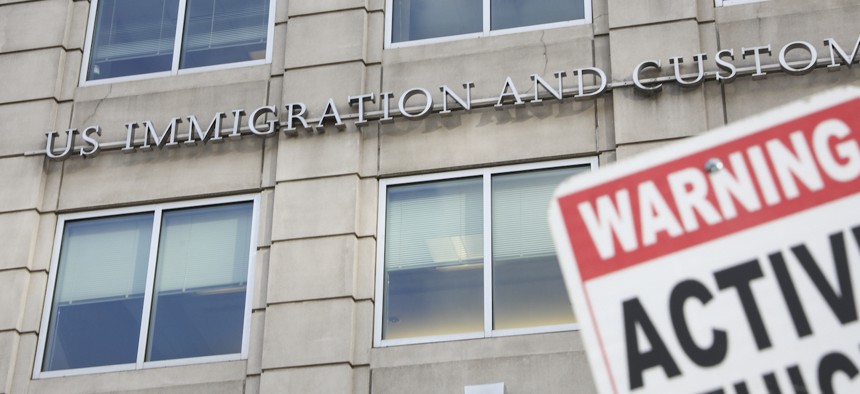
Special case reports, known as SCRs, are used by HSI to identify critical cases, measure and report its progress on them and justify congressional requests for additional resources. Celal Gunes/Anadolu Agency via Getty Images
ICE officials didn’t accurately report how they disrupted transnational criminals, OIG says
Immigration officials didn’t know how many transnational criminal organizations they impacted over five years due to a data filing misstep, according to the Homeland Security Department’s inspector general.
Officials at U.S. Immigration and Customs Enforcement’s law enforcement arm didn’t have accurate public information on its progress in disrupting transnational criminal organizations for five years due to data filing errors in its case reports, a new inspector general’s report claims.
The OIG report, published Tuesday, found that nearly 60% of the reports it sampled from Homeland Security Investigations — the ICE component tasked with investigating, disrupting and dismantling terrorist and criminal organizations — included special case reports involving non-transnational criminal organizations in its public reporting of TCO disruptions and dismantlements.
The special case reports, known as SCRs, are used by HSI to identify critical cases, measure and report its progress on them and justify congressional requests for additional resources.
However, the OIG reported that 253 SCRs it sampled, which were filed between fiscal 2017 and 2022, were found to detail cases where there was no association of individuals involved in the crime and where criminals did not cross international borders.
“We determined that HSI included 171 of 253 approved SCRs that did not involve a TCO in annual reporting calculations of its key performance measure from FY 2017 through FY 2022,” the report said. “Of these, HSI reported at least 123 specifically as disruptions and dismantlements for the same time period.”
This occurred because the HSI Office of Administrative Operations, which measures and publicly reports the agency’s TCO work, didn’t distinguish between TCO-related and non–TCO-related special case reports and did not validate the data used to calculate progress towards TCO goals, the OIG said.
“For HSI officials to approve an SCR, the SCR must meet the established criteria for the assigned category and subcategory. However, some categories and subcategories do not require that the SCR involve an entity that meets the definition of a TCO,” the report said.
The OIG identified 107 approved SCRs related to crimes against children included in the TCO figures that ultimately involved single domestic disputes, while three worksite enforcement/labor exploitation SCRs were included because the category didn’t require the reports to identify a criminal association operating across international borders.
“As a result of inaccurate reporting, ICE, Congress, and the public do not know how many TCOs HSI disrupted or dismantled from FY 2017 through FY 2022,” the report said.
The OIG also found that HSI program officials did not use SCR data in 98% of their resource requests during that five-year period, despite case activity that may have further justified the request, because agency guidance did not require the data to be considered.
The OIG offered three recommendations, including requiring special agents to identify whether criminal entities meet the definition of a TCO in their reports, that HSI implement data validation processes for accurate reporting and to develop guidance requiring the applicable use of SCR data in annual resource requests to Congress.
Agency officials concurred with the recommendations and have taken steps to address them by 2024.







